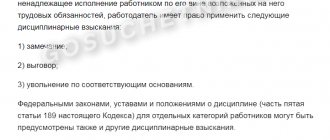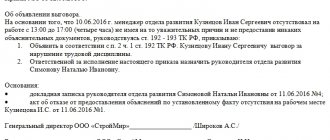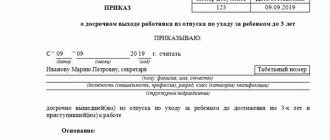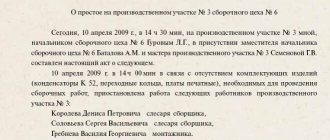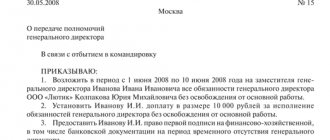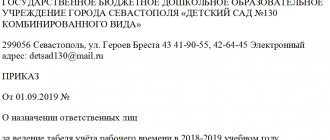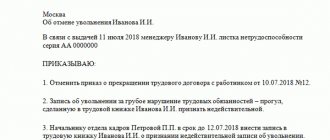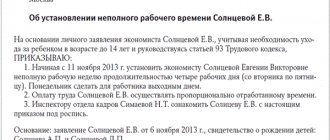Does Article 192 of the Labor Code of the Russian Federation define a reprimand as a type of disciplinary sanction?
A reprimand, along with measures such as reprimand and dismissal, in accordance with the provisions of Art. 192 of the Labor Code of the Russian Federation is a type of disciplinary sanction. At the same time, the management of the enterprise must clearly understand why an employee can be reprimanded. The practical significance of a reprimand can be expressed in 2 main aspects:
- Firstly, a reprimand as a disciplinary sanction may be one of the legal grounds for the dismissal of an employee (Clause 5 of Article 81 of the Labor Code of the Russian Federation) for repeated failure to fulfill duties in the presence of a disciplinary sanction. At the same time, a reprimand, on the one hand, is a disciplinary sanction, and on the other hand, it is a fact that indicates at least a one-time failure by the employee to fulfill his duties. 2 reprimands, provided that they are legal (how to ensure their compliance with this, we will consider later), give the employer the right to dismiss the employee. But only if they were issued for various offenses (Article 193 of the Labor Code of the Russian Federation).
- Secondly, a reprimand can be considered as one of the measures to improve production discipline. From this point of view, its imposition has more psychological than legal significance. An employee who has received a reprimand recorded in his personal file will most likely want to rehabilitate himself in the eyes of the employer and will begin to work better.
How to reprimand for improper performance of official duties
The official issuance of a reprimand is a legal fact, so this procedure must be properly formalized. The Labor Code of the Russian Federation and other federal regulations do not contain regulations that would determine how a reprimand is issued, but, based on practice, this action is recommended to be carried out according to the following algorithm:
- Firstly, the employer must document the fact of failure (or incorrect performance) by the employee of his duties. Most often, this is done by sending a memo to the director of the company by the immediate supervisor of the employee who committed the misconduct. An offense can also be recorded using a report drawn up by a commission formed by the head of the company to evaluate the employee’s actions.
- Secondly, the employer, before issuing a reprimand, must give the employee the opportunity to explain the actions he committed. To do this, it is necessary to send the employee a notice of the submission of an explanatory note.
- Thirdly, the employer needs to wait 2 days - this is how much time the employee has to draw up an explanatory note (Article 193 of the Labor Code of the Russian Federation). If he does not do this, the employer should draw up a corresponding act. Further (and also in the event that an explanation is presented, but the employee’s arguments do not look convincing), a reprimand can already be issued.
A reprimand is issued by issuing an order signed by the head of the company.
The order to issue a reprimand must:
- indicate that all the documents that we mentioned above are attached to it: a memorandum of misconduct (or an act of the commission), a notice of the need to submit an explanatory note, the explanatory note itself or an act of failure to submit it;
- indicate the dates and names of the relevant documents.
The order to issue a reprimand must be signed by:
- head of the company;
- by the employee himself within 3 days from the date of drawing up the order.
If the employee refuses to sign the document, it will be necessary to draw up a report about this (Article 193 of the Labor Code of the Russian Federation).
Information about the reprimand of an employee can be recorded in the personal file.
Why is it better to resolve the situation peacefully?
A person convicted of committing a serious disciplinary offense with further dismissal is always interested in changing at least the wording in the order. However, the employer himself may be interested in agreeing to a settlement.
The legality of termination of employment relations on the basis of the employee’s guilty actions is confirmed not so much by the fact of absenteeism, but by the correctness of the investigation procedure and assessment of the situation. The slightest flaw in the preparation of supporting papers makes it possible to challenge the employer’s decision and be reinstated in the same place and receive a financial bonus according to a court decision.
In order not to add complications to itself, management can offer a more acceptable, quick and painless way of separation - by agreement, Art. 78 TK. The main advantage is the irreversibility of the decision made. This means that the former employee will not be able to demand restoration of relations in any form, as well as declare the illegality of the actions of the company’s management.
Is it possible to reprimand without reprimand and is it issued for absence from work?
A remark is also a disciplinary sanction, but is considered a milder sanction, since Art. 192 of the Labor Code of the Russian Federation is slightly higher in the list of punishments. A reasonable question arises: should a reprimand be preceded by a reprimand, or can it be avoided?
Labor legislation does not rank punishments according to the degree of guilt and does not establish a strict sequence for their imposition. Therefore, the employer himself has the right to assess how great the employee’s guilt in the violation is and what sanction he deserves.
Thus, a reprimand may be issued for absence from work if there were valid reasons for missing work time, a reprimand may be issued if this was done deliberately without significant grounds, and even dismissal is possible when such a violation is systemic in nature.
Here only one constant principle should be observed: one violation - one type of punishment.
Collection of the amount
Apart from the previously discussed types of penalties for employee failure to appear, there are no other penalties. That is, it is not legal to fine those who are guilty or to deduct a certain part of the amount from their official salary. The only way to punish truants with a ruble is to deprive them of bonuses.
If an employer actively uses a system of fines at his enterprise, for example, fines for lateness, fines for absenteeism, then such actions themselves can lead to legal proceedings and monetary penalties.
The maximum amount of fines is provided:
- for officials – 5 thousand rubles;
- for business managers – 50 thousand.
Therefore, employers often withhold the unofficial part of employees’ wages, the part they receive in an envelope, which also does not comply with the law.
When is a reprimand issued?
A reprimand, like any other disciplinary sanction, must be issued by the employer within a month after the employee’s misconduct is revealed. The company has no right to punish the employee later. This period may be extended if the employee is absent from work due to being on sick leave or on vacation (including study).
The maximum period within which an employer has the right to issue a reprimand is 6 months. However, if a misconduct is revealed during an audit (for example, an audit), a reprimand can be issued no more than 2 years from the established date of the commission of this misconduct.
Criminal
Even in modern society, many people ask: can they be prosecuted for absenteeism? Fortunately, the days of such harsh punishments are long gone.
But in the era of Stalinism from 1940 to 1956, a person could be convicted for a single truancy, as well as:
- imprisoned for a term of 2 to 4 months;
- send to correctional labor;
- deprive one-fourth of your salary.
It is good that in our time the law is not so strict regarding the misconduct of workers.
Sample reprimand for improper performance of official duties
In order not to create a new document every time and not remember how this or that information is presented in it, it is better for the company to use a ready-made template. We present one version of the document on the website. Before reprimanding an employee, management will have to take this example as a basis and, if necessary, changing the wording and surname of the offending employee, print the required order.
How can an employer cancel a reprimand?
It happens that the employer comes to the conclusion that the employee was punished unlawfully and wants to remove the reprimand from him. How can I do that?
Very simple. All that is required to cancel a reprimand is to issue an appropriate order from the head of the company. It can be drawn up at any time (Article 194 of the Labor Code of the Russian Federation). The order to remove the reprimand must contain a reference to the order to issue the reprimand, indicating its date and number. You can see a sample order to remove a reprimand in the ConsultantPlus system. To do this, sign up for a free trial access to the system.
The employee himself or his immediate superior can also apply to have the reprimand lifted.
A sample of drawing up a petition to lift a disciplinary sanction was prepared by K+ experts. Get a free trial access to the system and proceed to the sample.
An employee is considered to have a disciplinary sanction after it has been issued for exactly 1 year, if during this time he does not commit other offenses, followed by other disciplinary sanctions (Article 194 of the Labor Code of the Russian Federation). In this regard, there is one more option for removing a reprimand from an employee - wait for its automatic cancellation.
Legal consequences of a reprimand for an employee at work
According to Art. 66 of the Labor Code of the Russian Federation, data on the reprimand are not recorded in the work book. As a last resort, the personnel service may (but is not obligated to) enter information about the reprimand into the employee’s personal card, which is an internal document. So the new employer, as well as any other entity, most likely will not know that any disciplinary action has been taken against the person.
This means that from the point of view of relations with the new employer (or some other persons legally independent of the current employer), the presence of a reprimand at work will not have significant legal consequences for the employee.
But the employee may be interested in maintaining his current job. And in this case, it will be useful for him to pay attention to one nuance.
In accordance with paragraph 5 of Art. 81 of the Labor Code of the Russian Federation, the employer has the right to dismiss an employee if he repeatedly fails to fulfill his official duties. This includes an offense for which the employee was reprimanded. The nuance is that the employer can use the following interesting mechanism for applying the norms of paragraph 5 of Art. 81 of the Labor Code of the Russian Federation, taking into account the provisions of Art. 193 of the Labor Code of the Russian Federation, establishing a one-month period for issuing disciplinary sanctions.
Having discovered an employee’s misconduct, the employer can, according to the established scheme, reprimand him and immediately issue a new order - for some other offense within a month’s prescription (if, of course, there was such an offense).
It turns out that the employer will have 2 proven facts of violation of labor discipline and he will immediately have the right to dismiss the employee. So employees who have once committed an offense to which the employer seems to have turned a blind eye should not provoke their superiors to impose an official disciplinary sanction - it may have direct legal consequences for them in the form of dismissal.
What is truancy
Absenteeism from work is the absence of a subordinate from work for more than 4 hours.
If an employee has violated the terms of the employment contract, you should not make a hasty decision and fire him. The main thing is to find out the reason.
Please note that there are exceptions. If a subordinate called his boss the day before and voiced over the phone why he couldn’t go to work, this is not considered absenteeism without a good reason.
But, not everything is so simple. If a controversial situation arises, it is necessary to confirm that the boss was notified. In this case, only witnesses or a recording of a telephone conversation will help.
It is also worth considering that employees have different responsibilities, and if the absence of one may not even be replaced by many, then the absence of another may affect the profit of the entire enterprise.
Example: if you are an ordinary secretary, but nothing bad will happen in the company during your absence. But if you are the chief engineer who is responsible for starting up the equipment and starting production for the whole day, then the losses can be colossal.
Reprimanding an employee: legal consequences for the employer
A reprimand is a legal fact, and it must be correctly executed. Many people forget that, for example, the Labor Code of the Russian Federation does not provide for any severe reprimands. The employer has no right to officially use this phrase. If he nevertheless gives the employee a severe reprimand, then the labor inspectorate (if the employee complains there) can:
- firstly, impose an impressive fine on the company based on clause 1 of Art. 5.27 Code of Administrative Offenses of the Russian Federation;
- and secondly, to cancel the order imposing a severe reprimand.
In addition, the employer has the right to impose any disciplinary sanction, including a reprimand, only if the employee fails to perform or performs his job duties incorrectly. However, these responsibilities must be recorded somewhere: in a contract, job description, labor regulations. And if the employer for some reason did not familiarize the employee with his duties against signature, then he does not have the right to reprimand for their failure to fulfill them.
Dismissal on the basis of a severe reprimand, other non-existent disciplinary sanctions, as well as when the reprimand is issued outside the regulatory framework, can be successfully appealed by the employee in court with a high probability of success. As a result, the court may oblige the employer to reinstate the person at work. And immediately. If the company does not do this, it will have to pay the employee a salary for the time that he was absent from the workplace, although by virtue of a court decision he should have been present (Article 396 of the Labor Code of the Russian Federation).
Failure to appear for a valid reason
- Absenteeism due to illness.
No one is immune from diseases and injuries, and citizens often do not go to work due to illness. Of course, you can go to a medical institution and get a sick leave, but this is not always possible. Although some simply ask for a document confirming that they were seen by a doctor.
As for injuries, you can take into account fractures, which can disable work for several days, or bruises and sprains.
In addition to your own illness, you should take into account that a child or a close relative may become ill. In this case, a doctor's certificate is required.
- Conducting a medical examination.
There is work that can only be started after passing a medical examination. This is required by kindergartens, catering establishments and many others. As a result of this, the employer may make a mandatory requirement in the employment contract that his subordinates must undergo inspection within a year, once or twice.
It turns out that if a citizen was not at his workplace due to undergoing a medical examination, this is not considered absenteeism. But do not forget that a subordinate cannot make a personal decision when to undergo an examination; this action must be agreed upon with his superiors and preferably in writing.
- Participation in litigation.
By law, any person can be summoned to court, as a victim or witness. In this case, failure to appear will be considered forced absence, which will not be punished.
- Utility accident.
At any moment, a utility accident may occur as a result of which you will not be able to go to work: your neighbors are flooded, a pipe bursts, a gas leak occurs, or a fire breaks out.
- Delay of wages.
This is interesting: Letter of reprimand sample 2021
If your boss delays payment of wages for more than 15 days, then you have the legal right not to perform work duties and attend to personal affairs until the other party fulfills its obligations. The law will be on the side of the subordinate and the boss will not be able to apply any punishment.
- Known circumstances.
Some employees ask to be released for personal reasons: they need to see a doctor, there is a wedding or a loved one’s birthday.
In such a situation, you must notify your employer in advance and ask for an additional day off. But you should notify in writing so that you have a copy with the number of the incoming letter.
There are various situations in which it is not possible to notify your boss in writing; in this case, you can simply call. If possible, record the conversation and save it.
- Absenteeism due to external factors.
These are so-called force majeure circumstances that can occur at any time. This may result in late arrivals or no-shows.
The following unforeseen circumstances can be identified:
- road accident;
- An elevator breaks down, leaving a subordinate “stuck” for several hours;
- Natural circumstances: snowfall, flood, strong wind or frost;
- Failure of transport, if this is the only means that allows you to get to work.
In conclusion, it is worth noting that the boss can admit the fact of absenteeism, but cannot fire a pregnant woman. Expectant mothers are protected, but this should not be used.
